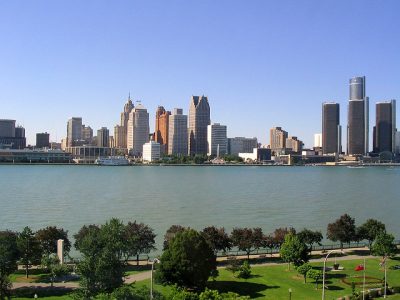Entrepreneurship & Innovation

U.S. Must Confront Challenges of Attracting Global Innovation Talent
Across the United States, innovative industries in the science, technology, engineering, and mathematics (STEM) fields have driven economic growth and job creation nationally and in metropolitan areas throughout the country. And the human capital—the people who are leading these innovations—comes not only from homegrown talent but also from a global labor market and talent pool. The U.S. has a well-established innovation economy, similar to other developed nations. But certain challenges exist for countries to attract talent to fuel these industries. A new report from the Migration Policy Institute (MPI) describes the policy challenges related to attracting individuals from the global talent pool. The authors recognize human capital as “the one resource that can propel firms and economies to the top tier of competitiveness.” There have been undeniable increases in the supply and demand for skilled workers worldwide as more places continue to transition to knowledge-based economies with rising occupational skill requirements. As such, in addition to advances in OECD countries, the report notes that as developing countries continue to grow, and as their immigration policies “become less bureaucratic and cumbersome, a much greater choice of destinations will open up for the internationally mobile.” Read More

Labor Day Celebrations Should Also Pay Tribute to Immigrant Workers
Americans are observing Labor Day, which pays tribute to the many contributions and achievements of American workers. As celebrations are underway, the holiday offers an opportune moment to reflect on the very concept of American workers. In other words, who is an American worker? Where do immigrants—who contribute their talents and labor to the production of goods and services in the United States—fit into the picture? Read More

Immigrant Business Owners Continue to Contribute to Communities Across America
During the August recess, Members of Congress have been meeting with constituents in their home states and districts. During this time, many have likely dined at an immigrant-owned restaurant or used the services of an immigrant-owned business within their home state. The fact is, immigrant businesses are important in many communities across America. Immigrant entrepreneurs bring in additional revenue, create new jobs, and boost local and state economies. Indeed, immigrant entrepreneurs and innovators continue to make contributions throughout the U.S. Read More

Our Immigration System Must Encourage Foreign Entrepreneurs to Invest in the U.S.
Immigrants started 33 percent of U.S. venture-backed companies between 2006 and 2012 that went public, according to a new report from the National Venture Capital Association. The report, however, also noted that there is no reliable immigration program for foreign entrepreneurs, who must surmount enormous legal difficulties in order to come here to create businesses and drive innovation and job growth. Read More

Immigrant Entrepreneurs Help Build U.S. Economy One Company at a Time
Google, Intel, eBay, Yahoo!, Facebook, LinkedIn, SanDisk, Altera, Zoosk, Etsy, Tesla Motors. What characteristic does each of these well-known companies share? They each were either founded by an immigrant or have at least one immigrant founder. Now, a new report from the National Venture Capital Association highlights the profound impacts that immigrant entrepreneurs—like the immigrants who helped to found major U.S. corporations—have on our economy. Immigrant entrepreneurs start companies throughout America in many different industries, creating value and new jobs in the United States, and advancing U.S. innovation. Read More

Forging Consensus on Visa Program Critical to Crafting Effective Policy
A proposal being considered in the House revives the debate around the number of visas that would be allocated to less skilled workers, also known as “W” visas. In particular, Representatives Ted Poe of Texas and Raul Labrador of Idaho are working on an immigration bill that could double the number of visas of less skilled workers that the Senate settled on. Although the increased number could help address the labor shortage in some industries, this proposal would potentially cause a fracture in the consensus achieved between business and labor leaders who negotiated the levels that were included in S. 744. Ultimately, what is critical to success of a program depends on having the right players at the table ensuring both private and public interests are protected. Read More

How States And Local Economies Benefit From Immigrants
Detroit usurped Jefferson County, Alabama’s place last week as the largest municipality in the United States ever to file for bankruptcy. And as signs increasingly pointed toward the city’s financial issues, local leaders in Southeast Michigan have been exploring ways in which to stabilize or strengthen Detroit’s economy. One way to do that is to encourage more immigrants to settle there. New restaurants, shops, and residents already have helped to revitalize one area in Southwest Detroit called Mexicantown. And there is no doubt that immigrant entrepreneurs and innovators play an important role throughout Michigan as well. Immigrant entrepreneurs create jobs, bring in additional revenue, and contribute significantly to the state’s economy. Highly skilled immigrants are vital to the state’s innovation activities, spurring further growth. As such, local leaders and advocates recognize the importance of immigrants in their communities and support immigration through local “welcoming” and integration initiatives. Read More

Immigration Reform an Imperative for Cities and Metropolitan Areas
Metropolitan leaders from around the country made the case for immigration reform at an event hosted by the Brookings Institution’s Metropolitan Policy Program today. Over 80 percent of the U.S. population, including 95 percent of immigrants, now live in metropolitan areas; cities and towns across the country therefore have a huge stake in passing immigration reform. In fact, panelists agreed that comprehensive immigration reform is an imperative for metropolitan areas. “We need an immigration system that is keeping with the times,” stated Audrey Singer, a Senior Fellow with Brookings. Read More

Immigration Reform Fattens State Economies, Too
“Should the United States be pro-immigrant?” asked Tax Watchdog Grover Norquist. “That’s like asking whether McDonald’s should make hamburgers. It’s made the United States work for several hundred years. It’s what’s made us different, what’s made us more successful,” said Norquist during a recent call summarizing a new report from Regional Economic Models, Inc. (REMI) on the economics of immigration reform. Read More

Supreme Court’s DOMA Decision Good for Economic Competitiveness
In the global economy of the twenty-first century, a globally mobile workforce is critical to remaining competitive. Yet for LGBT employees, their families, and their employers, significant barriers remain in place. The Supreme Court’s June 26 decision in United States v. Windsor finding part of the Defense of Marriage Act (DOMA) unconstitutional has clear and direct benefits for married same-sex couples, including bi-national couples. But beyond the benefits to married couples themselves, the Court’s decision is also a win for economic competitiveness. Specifically, the DOMA ruling makes U.S. businesses more globally competitive because they now can attract and retain foreign-born employees who want to stay in the United States with their same-sex spouses. Read More
Make a contribution
Make a direct impact on the lives of immigrants.
